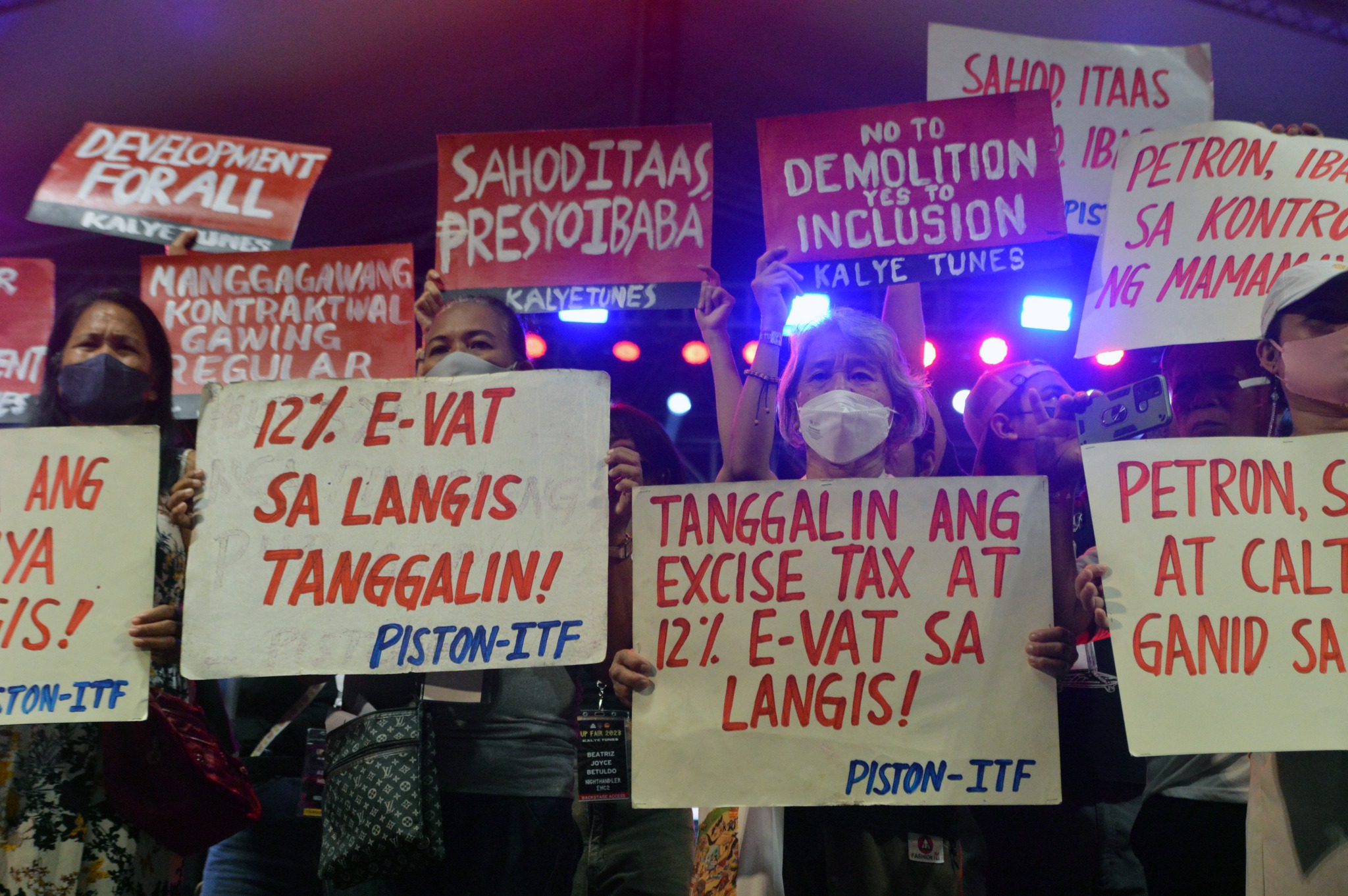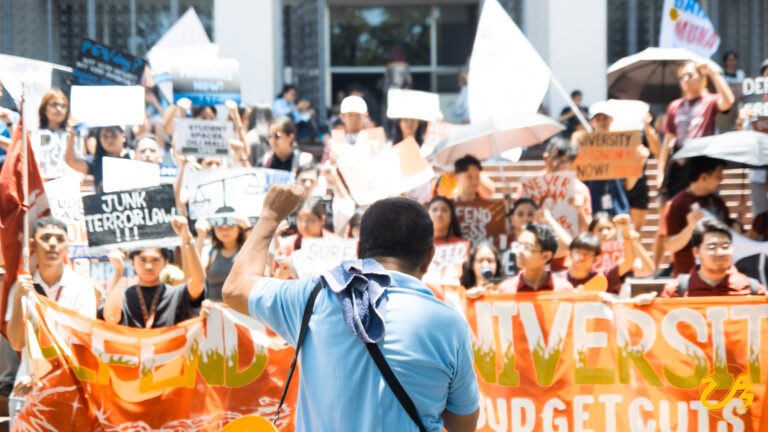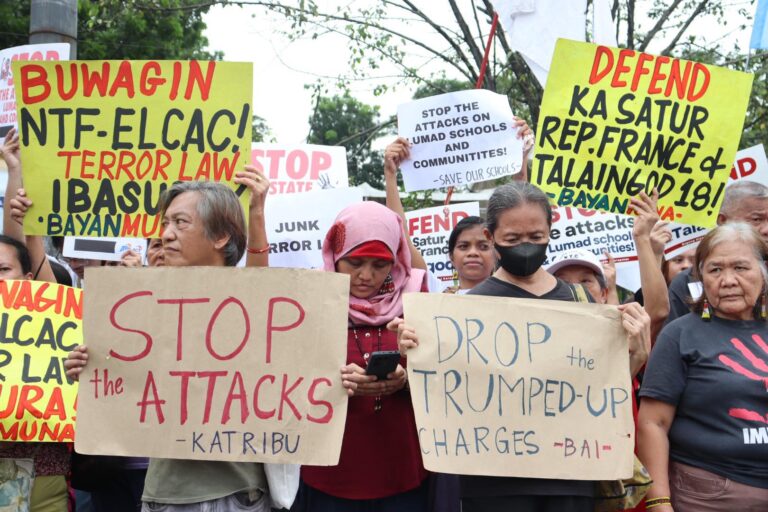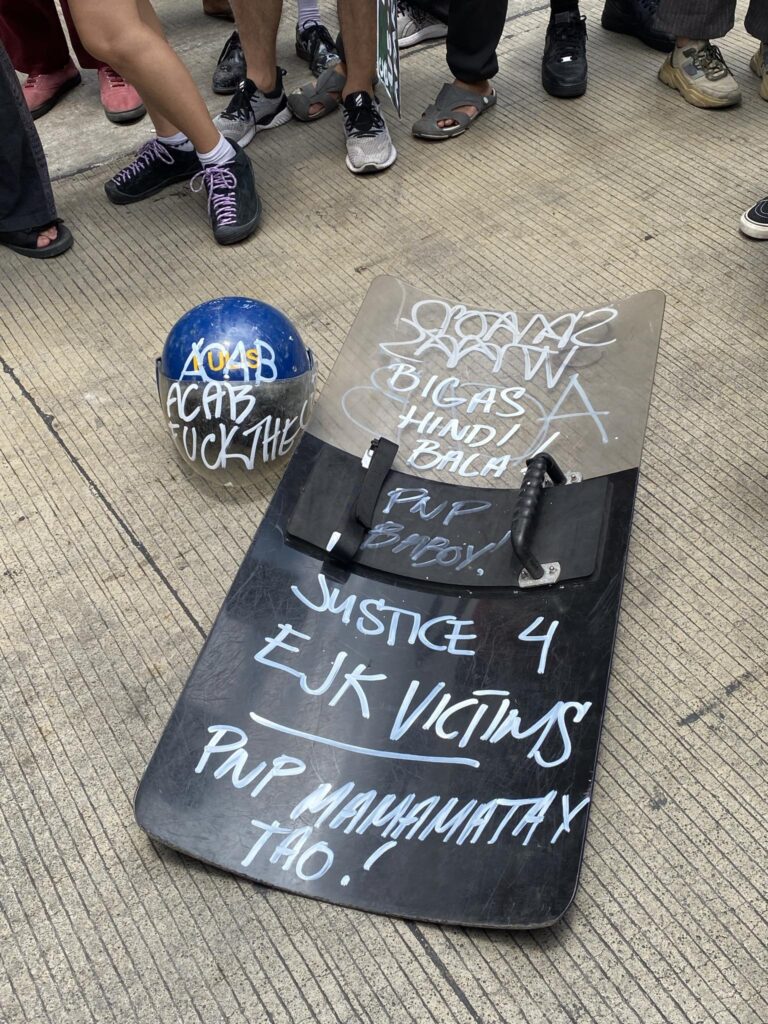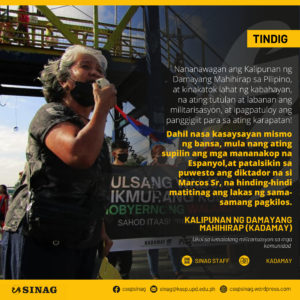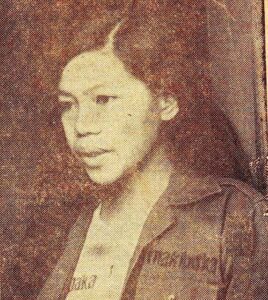
Pointing out the need to more effectively amplify its advocacies and address lapses in this year’s iteration, the UP Diliman community resolved to explore the possibility of junking the bidding guidelines altogether and instead focusing on a community-centric and advocacy-driven UP Fair.
In a dialogue spearheaded by the USC on March 13, different organizations and individuals from UP Diliman highlighted several key points of improvement for the UP Fair: ensuring that nighthandlers can uphold the fair’s progressive character, moving away from a “commercialized” to a more people-centric UP Fair, and creating more spaces for community calls to further amplify the fair’s advocacies.
Orgs demand admission of guilt, accountability from Upsilon
Several organizations questioned the selection of nighthandlers, particularly Upsilon Sigma Phi, saying that the aforementioned fraternity’s history of discrimination and violence marred the advocacy-centered fair’s reputation.
READ: https://sinag.press/news/2022/07/07/violence-has-no-place-in-up/
They claimed that Upsilon’s lack of accountability for past scandals such as LonsiLeaks – where screenshots exposed hate speech-filled conversations between the fraternity’s members – and violence such as in inter-fraternity brawls and hazing made them unfit to act as a nighthandler.
“Knowing the history of Upsilon Sigma Phi, like their Lonsi Leaks issue, wala ba tayong nakitang mali na isa sila sa mga successful bidders?” asked Anna Cubacub of UP Babaylan.
The University Student Council explained that they, too, were surprised when Upsilon became the top bidder for the fair with a bid of over P800,000.
USC Vice Chairperson Shine Reyes said that the council immediately consulted UP offices and previous UP Fair teams to see what they could do, and that these offices suggested that they could screen the nighthandlers by checking their org recognition status.
“If org-recognized kasi, ibig sabihin nun ay clear ang organizations sa mga offices. Since lahat ay org-recognized and we had to go through with the integrity of the process, doon nagbunga ang listahan ng mga NH,” she added.
Upsilon asserted that they also had clearance from the Office of Student Ethics.
Because of this org-recognition, the USC said, they could not prevent Upsilon from becoming a nighthandler, as they were not allowed to change the rules of the bidding process midway.
“Upon consultation with offices kasi, we have no legal basis to remove Upsilon as one of the official NHs. Kaya nga we acknowledge na it’s a lack of foresight on our end and kailangan talagang may changes sa bidding process.” said DEPPO Representative to the USC Aliyah Pascual, UP Fair Co-head.
Previously, Pascual released a statement with USC Councilor Ron Medina, her fellow UP Fair co-head, apologizing for the oversight in the bidding guidelines that allowed Upsilon Sigma Phi to become a nighthandler.
“The current bidding process awards the nights to the 5 highest bidders, as long as they are university-recognized formations. We recognize that the current bidding process can and will allow all such formations to bid regardless of their reputation and history,” they said in the statement.
They assured the community, however, that they were committed to calling for a UP Fair –and a university – that is a safe space for everyone, and an end to fraternity-related violence.
“As members of this community, we are one with the vision of a UP Fair true to its nature as an avenue for pressing campaigns, since after all, UP Fair is first and foremost a protest,” Pascual and Medina ended.
Still, several organizations asked why, after all of these years, the fraternity remained silent about their scandals.
“Bakit sa buong panahong yun, bakit walang kahit anong maririnig yung students mula sa upsilon? Yun kasi yung tingin kong kailangan ng estudyante. Kapag iniisip ng estudyante yung mga nangyari noon, bakit walang sinabi?” asked Stand UP’s Gabriel Magtibay.
The fraternity replied that they had released a statement on January 21 that included their stances and the action steps that they have taken.
READ: https://tinyurl.com/UpsilonStatement
In the statement, Upsilon said that they are “one with the UP community in opposing any form of oppression of marginalized sectors and intersectional communities,” and mentioned Upsilon’s initiatives to revisit its “commitments for inclusivity, equality, and service.”
Although the statement does include the fraternity’s action steps such as cooperation with the UP administration during investigations, gender sensitivity and anti-sexual harassment trainings, and multi-sectoral engagements, it does not directly mention any of the previously cited issues such as LonsiLeaks, the AS brawl, or hazing practices within the fraternity.
The answer left many organizations unsatisfied.
“May mga nasabi na ang Upsilon na meron silang mga measures internally. But the first step should be recognition of their wrongdoings, so when will you apologize to all of us?” asked UP Babaylan.
The fraternity replied that they were complying with UP Offices to hold their members accountable, and were also trying to “face the culture itself.”
But, as UP Babaylan pointed out, it has been 4 years since Lonsi Leaks, and not a single fraternity member has been held accountable.
For the USC, scrapping the guidelines altogether may be a wise course of action, as it would prevent this from happening again.
They also reiterated their stance against fraternity-related violence, and committed to creating more programs to address these concerns through the council’s gender committee.
Community-centered, not commercialized UP Fair
Another problem that the community saw was the increasing commercialization of the fair, as they claimed that it diminished the activity’s militant character.
UP JMA raised the issue of around 10 compiled cases regarding individuals who sold complimentary tickets, some of whom were allegedly members of the UP Fair team themselves.
They said that because of this, the financial integrity of the event had already been tainted.
But the bidding process itself, the organizations said, was an even bigger problem, as UP Alyansa pointed out that there seemed to be an undue focus on the financial capacity of the nighthandlers rather than their organization’s history and ability to amplify the advocacies.
The USC recognized this too, saying that “since the bidding process in its very essence is still bidding, there is a need to make a process that would be more community-centric, which would also resolve the concerns regarding “UP Fair being commercialized”.
Because of this, the USC further emphasized the need to overhaul the guidelines for the conduct of the UP Fair, heralding the UPLB Feb Fair as a good example of the direction it should take.
In UPLB, councils take a more central role in planning the fair, with the organizations acting more like advocacy partners.
“Paghahalawan ang practice na mayroon ang UPLB Feb Fair na maglalayo sa masyadong ‘commercialized’ na itsura ng UP Fair at babalik sa pimerya nitong sadya – isang protesta,”
UP Fair calls must be front and center
The community also lamented a shortage of spaces for advocacies, saying that if UP Fair is to truly be a protest, the UP community’s calls, alongside the calls of the basic masses, should be placed front and center.
On the fairgrounds, for example, only ten advocacy booths were allowed, with the rest of the 80 fairground booths being allocated for non-advocacy booths such as food stalls.
The USC explained that because of COVID-19 restrictions, they were only allowed to open 80 booths, and that alongside these ten weeklong booths, the night handlers were also given ten booths to allocate to their advocacy partners.
Still, they recognized that this had to be improved in the future.
“We acknowledge talaga na this is a point of improvement and we will be recommending this to future UP Fair Teams to find a balance between advocacy booths and concessionaire booths,”
Stand UP also pointed out that, because of how the fair had to select night handlers, some sectors were underrepresented in the fair.
“Dahil namimili ang mga NH ng kanilang mga advocacies, may mga ibang sectors na hindi nakukuha bilang ‘advocacy.’ Isa na dito ay ‘yong Peasant sector lalo na at mainit ang sitwasyon at malala ang atake sa kanilang sector,” they said.
League of Filipino Students – UP Diliman Chairperson Louise Espiña also said that while the fair was able to serve as an avenue for amplifying their calls, it could have done so better.
“Naging mahalaga yung pagpaabot ng no to mandatory rotc and no to jeepney phaseout. Para mas concretely makita, may almost 1000 signatories sa petition, and many more signups din for the org. Pero point of assessment ay sana magkaroon ng mas malapit na integration with advocacy booths.”
She said that they could have allocated more time during the program for advocacy booths to raise their calls as well.
Meanwhile, Kariton ng Maralita Network, an advocacy partner for Upsilon Sigma Phi’s Polaris, complained that their time to speak was delayed several times, forcing them to wait backstage instead of using the time to further amplify their advocacy.
“Pinakanapansin namin, nung magsasalita na po kami, late po kami natawag. 8, tapos naging 11, tapos na-adjust na po nang na-adjust. Nahirapan po kaming intindihin kung bakit mahirap bigyan ng oras ang mga advocacies namin,” they said.
The USC recognized these shortcomings, and said that it is important to learn from these mistakes.
“Balikan natin yung esensiya ng UP Fair na protesta, at katulad ng protesta, pinaghahandaan ito, ikinakasa ito, at muli itong ina-assess para sa susunod ay mas mapabuti,” said USC Councilor Neo Aison.
By moving towards a more Feb Fair-like system, they believe that the next UP Fair will be resolve the problems that the current iteration faced.
“Mula dito, kakayaning gawing community-centric ang mga susunod na UP Fair sapagkat mas mapakikinggan ang hinaing ng bawat miyembro ng ating komunidad,” the USC stated.
In the end, the UP community hopes that the next UP Fair will be able to live up to its history as an advocacy-driven protest fair and an avenue to introduce a wider audience to vital mass campaigns.

